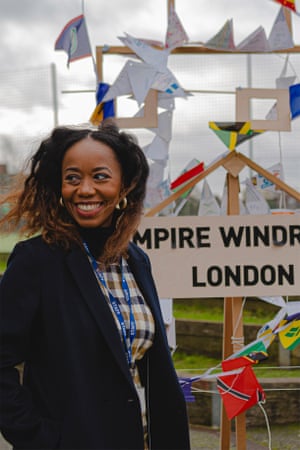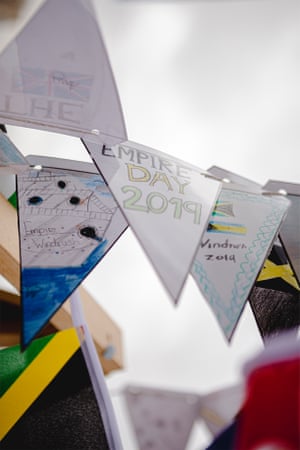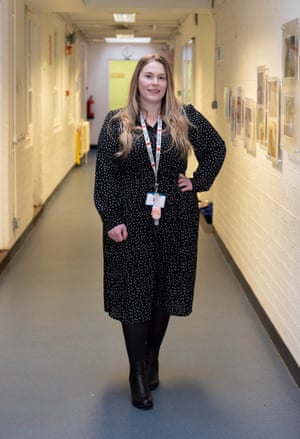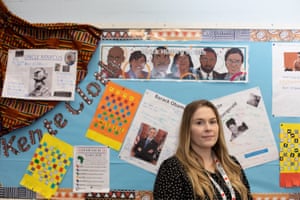You may have learned about Henry VIII and his six wives at school, but did you know that the Tudor king had a Black trumpeter named John Blanke?
“We’ve got to assume [Blanke] was a good trumpeter because he petitioned for a pay rise and he got it,” says Shalina Patel, a history teacher and head of teaching and learning at Claremont high school academy in Harrow, north-west London.
Patel is passionate about teaching “hidden histories” to her students; uncovering the stories of influential but lesser known historical figures such as Blanke, who is one of the earliest recorded black people in England. Her commitment was recognised in 2018 when she was named as a Pearson National Teaching Awards silver winner in the teacher of the year category.

-
Shalina Patel
As well as Blanke, Patel teaches about Sophia Duleep Singh, a prominent suffragette in the UK, who for many years was written out of history. “She was at the heart of the suffragette story,” says Patel. “I was surprised and annoyed at myself, and at history, because I didn’t know about her initially.”
Other hidden figures fleshed out in Patel’s classroom range from Olive Morris, a key figure in the British Black Panther movement during the 1970s, to the fourth-century Roman woman known as Ivory Bangle Lady, who was found buried with her riches.
“It’s about weaving these stories into the historical narrative you’re already teaching,” says Patel, who studied history and then a PGCE at University College London. During her degree, Patel volunteered in schools and quickly realised that she wanted to pursue a career in teaching. “I love planning lessons,” she says. “For me it’s a really creative process and I don’t know if a lot of people realise that.”
_(1).jpg?width=300&quality=85&auto=format&fit=max&s=ae586920e3e544521f1316d42a6c688f)
-
Patel accepts her Pearson National Teaching Awards silver winner’s trophy
One of her recent lessons focused on the recruitment of soldiers during the first world war. “I showed the students posters that were printed in India and the Caribbean, so they’re seeing recruitment through several lenses and not just one,” she says. It’s a tactic that clearly sparks her pupils’ imaginations. “One student asked me whether Indian soldiers had halal food in the trenches and I thought, what an incredible question,” says Patel. “So I looked into it and, amazingly, there was halal meat in the trenches.”
Patel is not alone in sharing her love for unearthing stories outside the mainstream British history narrative with her students. Djamila Boothman is assistant head and an English teacher at Woodside high school in Haringey, east London. Boothman managed a hotel in Antigua for six years before returning to the UK to train as a teacher through Teach First. “In the interview we talked about [addressing disadvantages] and I thought this is what I want to do,” she says.


.jpg?width=300&quality=85&auto=format&fit=max&s=4a12f0f7d6e8045c1bfb8b5272bfec37)
-
Djamila Boothman, who organised a Windrush festival for her students, complete with Caribbean flags, food and costume making
To help facilitate this, she’s created an elective curriculum called “melting pot”, which allows her diverse body of students to explore their own identities by researching notable people from their cultures. “I’ve got Turkish students, Somalian students, and Polish students, for example,” she says. “I want them to all leave school with their heads held high, proud of their backgrounds, and knowing that who they are isn’t a limitation, but a superpower.”

The elective curriculum also enables Boothman to share her passion for her own heritage with students, with a large chunk of the syllabus focusing on the Windrush generation. “We look not only at the actual journey [people made], but the reasons for the journey, the backstory, the expectations people had, what they left behind, what they found when they arrived, and the influence they’ve had on everything from food to popular culture,” she says.
A particular highlight was a Windrush festival Boothman organised in 2019, with funding from Haringey council. “My grandparents were there and we also invited people from the local care home. We had Caribbean flags and food, a costume-making section, face painting, a calypso artist, and a carnival DJ and costumes,” she says. “It was a really great day.”
Teaching hidden histories isn’t only the reserve of secondary education. Letitia Carter teaches at an autism-specific primary school in Handsworth, Birmingham. “Teaching was something I’ve always known I’ve wanted to do,” she says. “Plus autism is close to my heart because I have family members with autism.”
Carter, who did a BEd at the University of Worcester, created a special project around Black History Month using a series of activity books that focus on a different notable figure, and even invited the author, Andrew Lindo, to read to the students. “The children loved the fact he’d written the books they’d seen,” says Carter. “They looked to him almost as a celebrity.”
Imagination and interaction were at the heart of the project, something Carter explains is vital with her students. “Our learners are very literal [in the way they learn] so we have to be really creative in the way that we teach,” she says. “For each historical figure, we gave the children some background about the person, then tasked them with doing some mini research, creating a poster, and then presenting their work to the rest of the class.”

-
Letitia Carter teaches at an autism-specific primary school
Talking about why she felt the project was so important, Carter says: “Not only are we educating our students about Black history, but we’re also teaching them to be more accepting of each other.” Boothman agrees, adding: “I want to challenge my students … wherever you see the story of the victor, look for the story of the vanquished.”
For Patel, sharing these hidden histories is about preserving the past before it’s too late. “So many stories have been lost completely,” she says. “That’s why it’s important to weave these ones in at least.”
In teaching every day is different, and so is every teacher. Discover 100 teachers across the country, shaping lives. And if you’d like to know how you can bring your individual passions to a job in teaching, head to Get Into Teaching to find out more.
from Lifestyle | The Guardian https://ift.tt/36zLSqk
via IFTTT

comment 0 Comment
more_vert